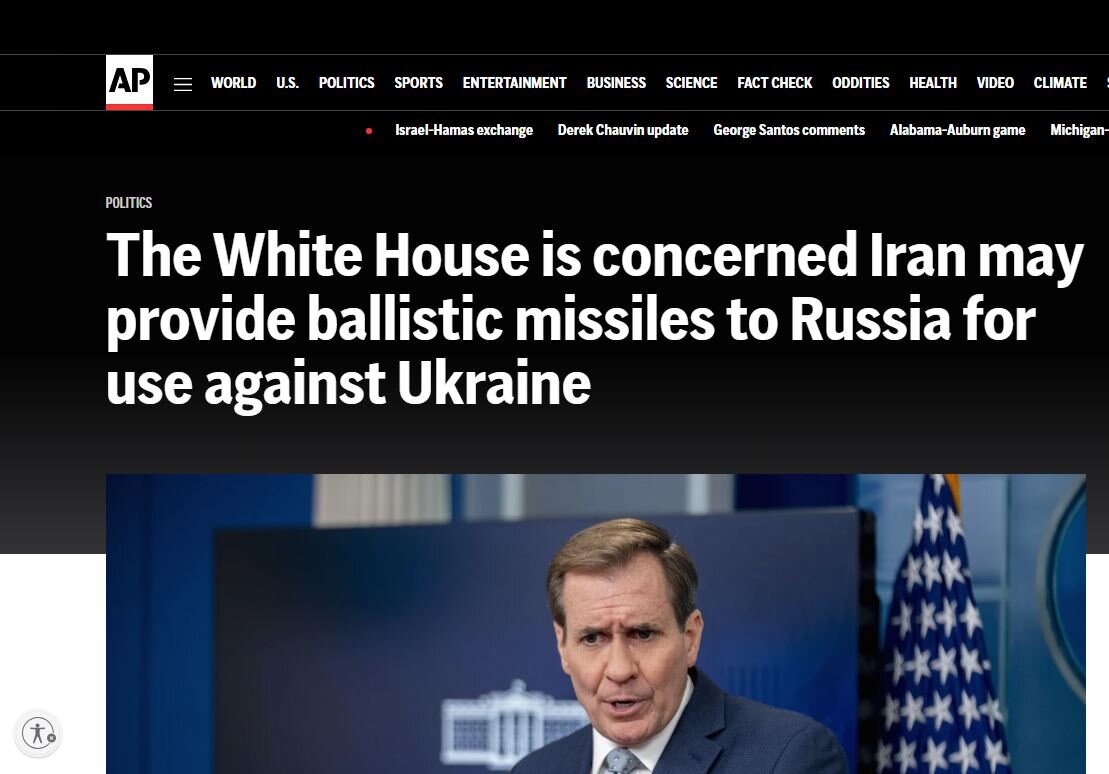West scapegoating Tehran-Moscow partnership for failure in Ukraine

TEHRAN- Referring to the concerns of American officials about the military cooperation between Iran and Russia, the Associated Press news agency has made a bid to portray Iran as the cause of the West's defeat in the Russia-Ukraine war.
On November 22, AP quoted John Kirby, National Security Council Spokesperson, as saying, "Iran has already been providing Russia with unmanned aerial vehicles or drones, guided aerial bombs and artillery ammunition, in return for that support, Russia has been offering Tehran unprecedented defense cooperation, including on missiles, electronics, and air defense.”
Kirby also said that in total, Iran is seeking billions of dollars worth of military equipment from Russia to strengthen its military capabilities.
He called the burgeoning military partnership between Iran and Russia “harmful to Ukraine, Iran’s neighbors in West Asia and to the international community.”
Neighborly cooperation is legitimate
Regarding the importance of cooperation between countries, Aleksandra Kusztal, in her November 2017 article, stated that the sources of cooperation in the area of regional security can be perceived in two ways: Firstly, as a result of the natural desire of states to cooperate with each other, striving for regional integration, and the expression of the identity and regional culture. Secondly, primarily in the effect of states' endeavors to obtain hegemony in the region, the desire to protect sources of security diversification, and finally the result of the belief that collective action can be more effective in countering threats and mitigating effects of the weakness of nation-states in the anarchic international environment.
Back in August, Deputy Russian Foreign Minister, Sergei Ryabkov, said that military cooperation between Iran and Russia will continue despite the enemies' opposition, adding that Russia is committed to cooperation with friendly countries like Iran.
Speaking to reporters, the Russian deputy foreign minister said that the "legitimate" and "very substantial" cooperation between Iran and Russia will continue despite all attempts by enemies of Iran and Russia to disrupt and derail it.
"We have full right to develop and enhance this cooperation and a firm political resolve to do so," he said.
Moreover, the Tehran-Moscow relationship can be termed as “strategic” based on the two nation’s economic and geographical interests.
Since the fall of the Soviet Union, the two neighboring nations have generally enjoyed very close cordial relations.
Russia has also become a key trading partner to Iran, especially in regard to Iran’s oil reserves.
Therefore, the bilateral partnership between Iran and Russia is legitimate and does not pose any threats to other countries.
Ukraine a Western tool to demonize Iran-Russia ties
Western officials’ endeavors to counter Russia via the Russia-Ukraine war have been defeated, so Western authorities have sought excuses to downplay their failed Ukraine policy.
The claim that Iran sent a UAV shipment to Moscow, which has been baselessly trumpeted by Western authorities, has been rejected by Iranian officials.
Since February 24, 2022, the starting date of the Moscow-Kiev war, Iranian officials have invited both sides to avoid war and turn to the negotiation table.
Also, in the wake of claims over Iran’s drone cooperation with Russia, the Iranian officials, in their address to Ukrainian officials, have urged them to provide evidence.
Iranian Foreign Minister Hossein Amir Abdollahian said on November 5 that Iran supplied drones to Russia months before the beginning of the war in Ukraine. But this cooperation was not intended to harm third countries.
"We provided Russia with a limited number of drones months before the war in Ukraine," Abdollahian said after a meeting in defense of the UN Charter held in Tehran with deputy ministers from several countries.
He added that Tehran-Moscow ties are based on neighborliness and common interests.
The Iranian diplomat maintained that during a conversation with his Ukrainian counterpart, Dmytro Kuleba, they agreed that Kyiv would hand over evidence of the use of those Iranian drones in the conflict. "If it is confirmed that Russia used Iranian drones in the war against Ukraine, we will not be indifferent to this issue," Abdollahian stressed.
Denying the accusations concerning Iran’s drone shipment to Moscow, Amir Abdollahian rejected these accusations as “completely false.”
“We firmly reject the baseless allegations of the three European countries and the U.S. about Iran selling drones to Russia,” Iranian ambassador to the UN, Amir Saeed Iravani, said on 24 October, referring to France, Germany, and the UK, which are collectively known as the E3.
All in all, blaming the defeat of the West in the Ukraine war on Iran is political propaganda, which seeks to demonize Tehran-Moscow relations and portray them as a threat to global peace and security.
